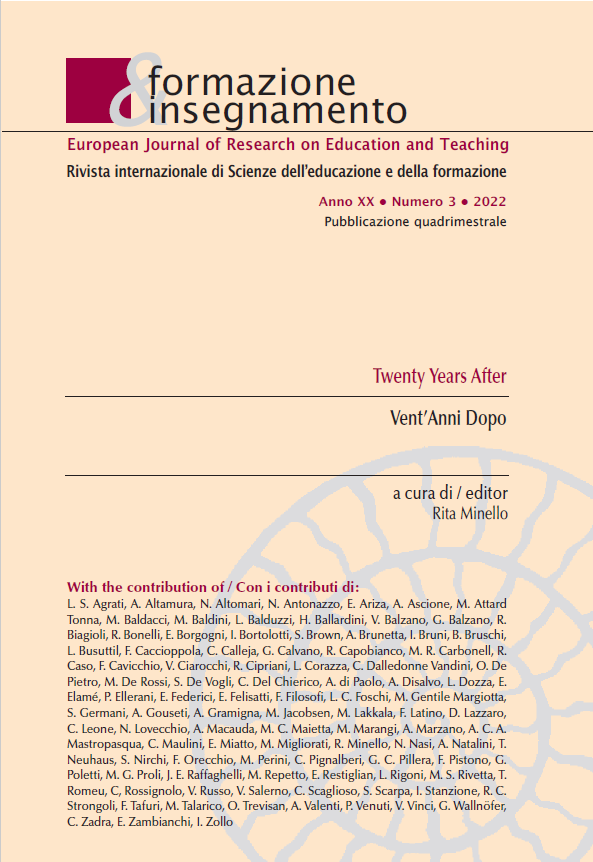Training and industry 4.0: Training practices and challenges between technology and awareness (the voice of the trainers)
DOI:
https://doi.org/10.7346/-fei-XX-03-22_42Keywords:
Continuous training, Industriy 4.0, Educational Technologies, Trainers Competencies, Training PracticesAbstract
Given the influence that the Industry 4.0 phenomenon has on the world of education and training, it is necessary to monitor its evolution in order to enable educational and training institutions to update their curricula and acquire new technologies and training practices to support teaching activities. Through the collection and analysis of the testimonies of a group of 21 Italian continuing education trainers, an attempt was made to frame and understand the direct and indirect effects of Industry 4.0 on Italian training processes, methods, and training contexts in order to return a set of useful information for both the world of vocational training and the world of generalist education, as it too is called upon to confront this phenomenon. The information that emerged may be useful for recalibrating and localising educational training models oriented towards digitalisation and technological innovation.
References
Abele, E., Chryssolouris, G., Sihn, W., Metternich, J., ElMaraghy, H., Seliger, G., Sivard, G., ElMaraghy, W., Hummel, V., Tisch, M., & Seifermann, S. (2017). Learning factories for future oriented research and education in manufacturing. CIRP Annals - Manufacturing Technology, 66(2), 803–826. https://doi.org/10.1016/j.cirp.2017.05.005
Abidi, M. H., Al-Ahmari, A., Ahmad, A., Ameen, W., & Alkhalefah, H. (2019). Assessment of virtual reality-based manufacturing assembly training system. International Journal of Advanced Manufacturing Technology, 105(9), 3743–3759. https://doi.org/10.1007/s00170-019-03801-3
Avis, J. (2018). Socio-technical imaginary of the fourth industrial revolution and its implications for vocational education and training: a literature review. Journal of Vocational Education & Training, 70(3), 1–27. https://doi.org/10.1080/13636820.2018.1498907
Azevedo, A., & Almeida, A. H. (2021). Grasp the challenge of digital transition in smes—a training course geared towards decision-makers. Education Sciences, 11(4), 1–20. https://doi.org/10.3390/educsci11040151
Balocco, V. (2022). Industria 4.0, in Europa aziende ancora ai blocchi di partenza. Costi e tempistiche gli ostacoli sul cammino - CorCom. Retrieved September 30, 2022, from https://www.corrierecomunicazioni.it/industria-4-0/industria-4-0-in-europa-aziende-ancora-ai-blocchi-di-partenza-costi-e-tempistiche-gli-ostacoli-sul-cammino/
Charmaz, K. (2006). Constructing Grounded Theory. A Pratical Guide Through Qualitative Analysis. Sage.
Coban, M., Bolat, Y. I., & Goksu, I. (2022). The potential of immersive virtual reality to enhance learning: A meta-analysis. Educational Research Review, 36, 100452. https://doi.org/10.1016/J.EDUREV.2022.100452
Della Valle, E. (2022). Docenti e formazione: Per un’implementazione sostenibile del digitale. Formazione & insegnamento, 20(1), 868–867. https://doi.org/10.7346/-fei-XX-01-22_77
Glaser, B., Strauss, A., & Strutzel, E. (1968). The discovery of Grounded Theory; strategies for qualitative research. Nursing Research, 17(4), 364.
Koren, I., & Klamma, R. (2018). Enabling visual community learning analytics with Internet of Things devices. Computers in Human Behavior, 89(February), 385–394. https://doi.org/10.1016/j.chb.2018.07.036
Liao, Y., Deschamps, F., Loures, E. de F. R., & Ramos, L. F. P. (2017). Past, present and future of Industry 4.0 - a systematic literature review and research agenda proposal. International Journal of Production Research, 55(12), 3609–3629. https://doi.org/10.1080/00207543.2017.1308576
Moldovan, L. (2019). State-of-the-art Analysis on the Knowledge and Skills Gaps on the Topic of Industry 4.0 and the Requirements for Work-based Learning. Procedia Manufacturing, 32, 294–301. https://doi.org/10.1016/j.promfg.2019.02.217
Perini, M., & Pentassuglia, M. (2018). One Step Forward : Advancing Knowledge on Italian VET-Laboratory In- structional Practices. Trends in Vocational Education and Training Research. Proceedings of the European Conference on Educational Re- Search (ECER), Vocational Education and Training Network (VETNET), September 2015, 289–296. https://doi.org/10.5281/zenodo.1319698
Perini, M., Tommasi, F., & Sartori, R. (2022). Quali competenze e quali strategie formative per l’industria 4.0? Lo stato dell’arte. Qwerty - Open and Interdisciplinary Journal of Technology, Culture and Education, 17(1). https://doi.org/10.30557/QW000039
Pfeiffer, S. (2018). The “future of employment” on the shop floor: Why production jobs are less susceptible to computerization than assumed. International Journal for Research in Vocational Education and Training, 5(3), 208–225. https://doi.org/10.13152/IJRVET.5.3.4
Potti, G. (2021). Industria 4.0, a che punto sono Italia ed Europa: bene le tecnologie ma servono competenze - Agenda Digitale. Retrieved September 30, 2022, from https://www.agendadigitale.eu/industry-4-0/industria-4-0-a-che-punto-sono-italia-ed-europa-bene-le-tecnologie-ma-servono-competenze/
Punie, Y. (Ed.), & Redecker, C. (2018). DigCompEdu. Il quadro di riferimento europeo sulle competenze digitali dei docenti (S. Bocconi, J. Earp, & S. Panesi, It. Trans.). Istituto per le Tecnologie Didattiche,Consiglio Nazionale delle Ricerche (CNR-ITD). https://doi.org/10.17471/54008
Roldán, J. J., Crespo, E., Martín-Barrio, A., Peña-Tapia, E., & Barrientos, A. (2019). A training system for Industry 4.0 operators in complex assemblies based on virtual reality and process mining. Robotics and Computer-Integrated Manufacturing, 59(July 2018), 305–316. https://doi.org/10.1016/j.rcim.2019.05.004
Roll, M. J. J., & Ifenthaler, D. (2021). Multidisciplinary digital competencies of pre-service vocational teachers. Empirical Research in Vocational Education and Training, 13(1). https://doi.org/10.1186/s40461-021-00112-4
Sangmeister, J., Winther, E., Deutscher, V., Bley, S., Kreuzer, C., & Weber, S. (2018). Designing Competence Assessment in VET for a Digital Future. In Digital Workplace Learning (pp. 65–92). Springer International Publishing. https://doi.org/10.1007/978-3-319-46215-8_5
Sità, C. (2012). Indagare l’esperienza. L’intervista fenomenologica nella ricerca educativa. Carocci editore.
Tacconi, G. (2011). La didattica al lavoro. Analisi delle pratiche educative nell’istruzione e formazione professionale. FrancoAngeli.
Tacconi, G., Gomez, G. M., & Perini, M. (2019). Pratiche di progettazione didattica e valutazione degli apprendimenti nei CPIA del Veneto. In G. Tacconi & N. Morbioli (Eds.), Reinventare la Scuola (p. 217). Erickson.
Tommasi, F., Perini, M., & Sartori, R. (2022). Multilevel comprehension for labor market inclusion: a qualitative study on experts’ perspectives on Industry 4.0 competences. Education + Training, 64(2), 177–189. https://doi.org/10.1108/ET-04-2021-0146
Downloads
Published
How to Cite
Issue
Section
License
Copyright (c) 2022 Marco Perini

This work is licensed under a Creative Commons Attribution 4.0 International License.
Formazione & insegnamento is distributed under Attribution 4.0 International (CC BY 4.0).
For further details, please refer to our Repository & Archiving Policy, as well as our Copyright & Licensing Terms.





